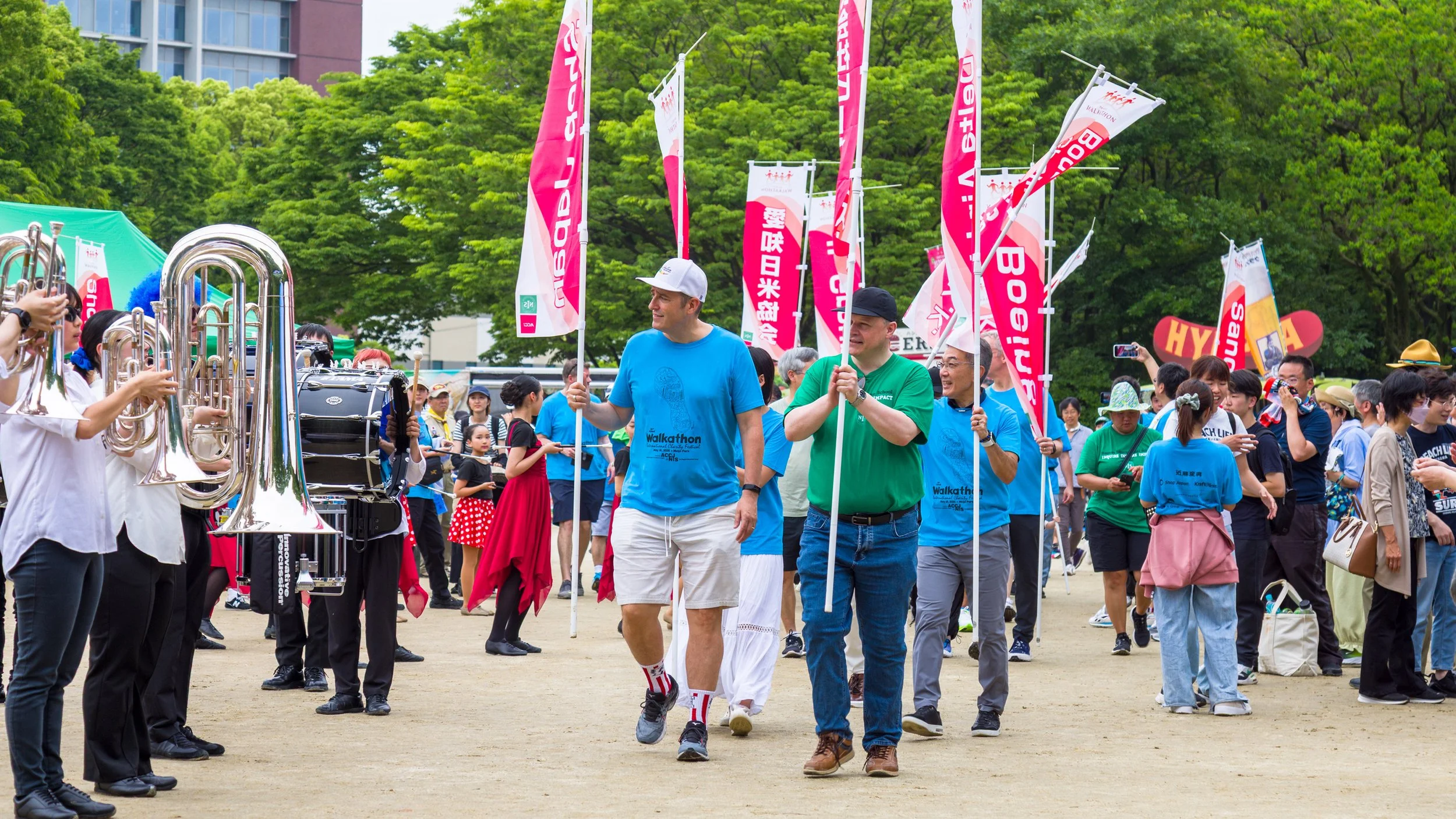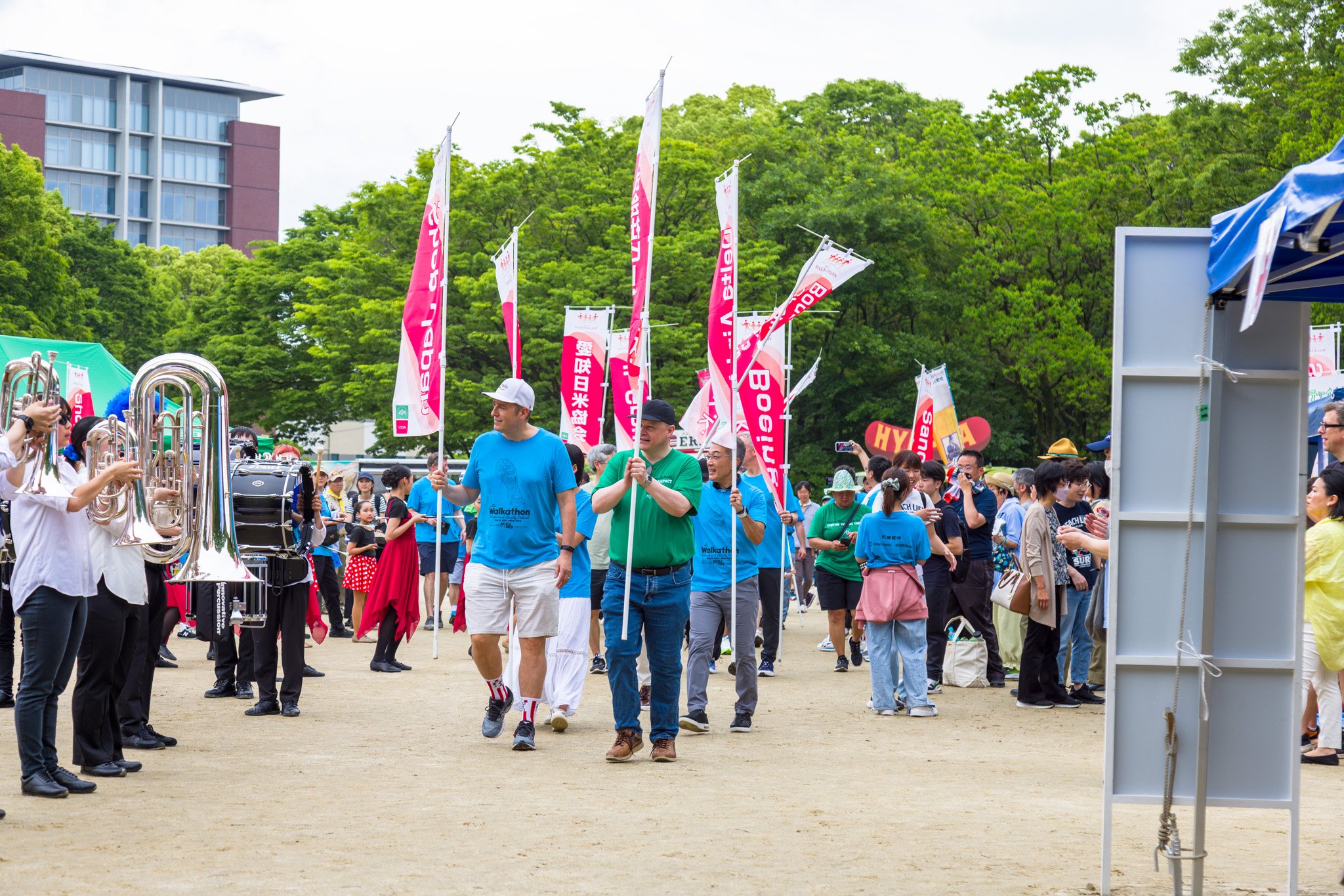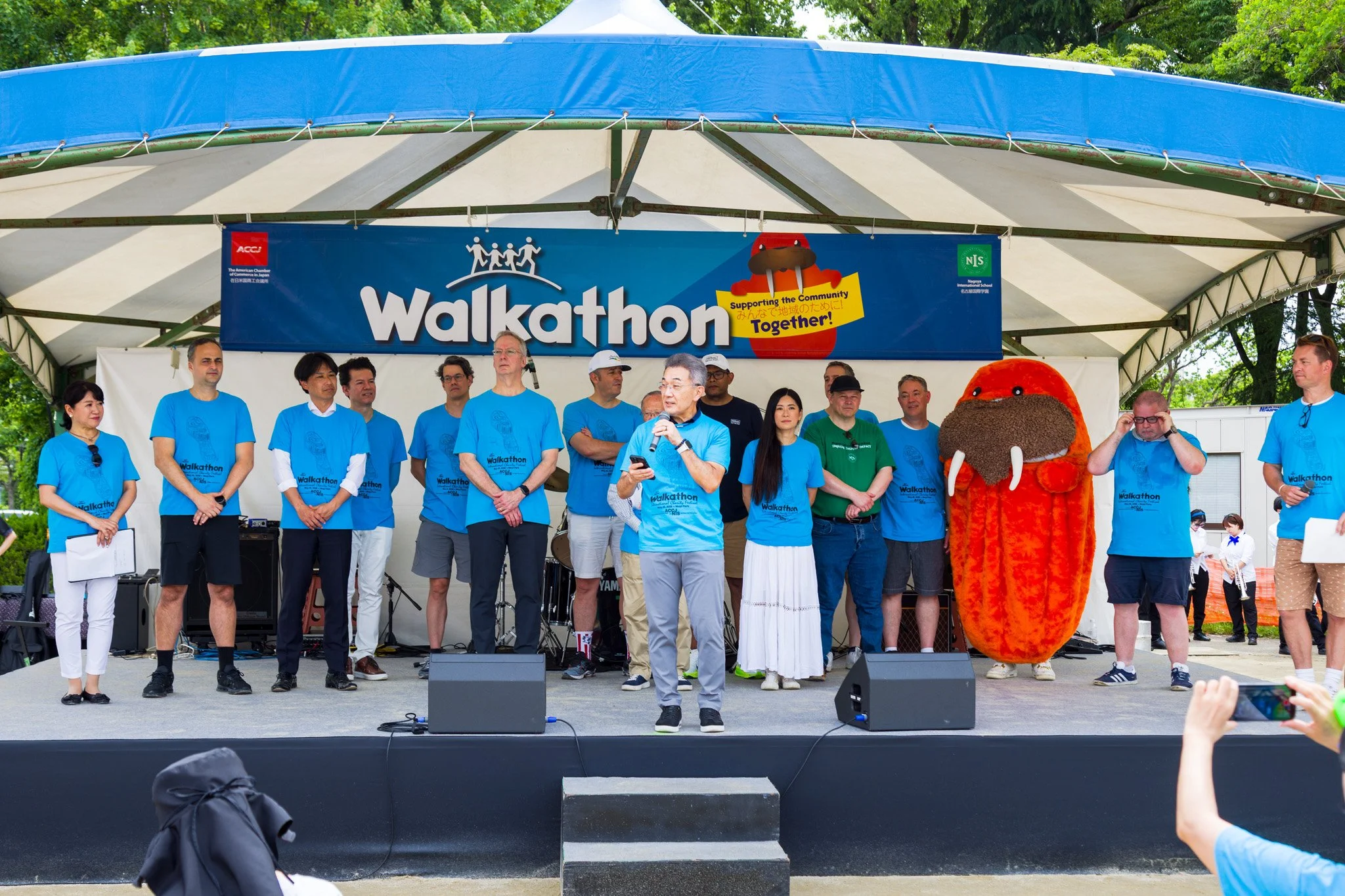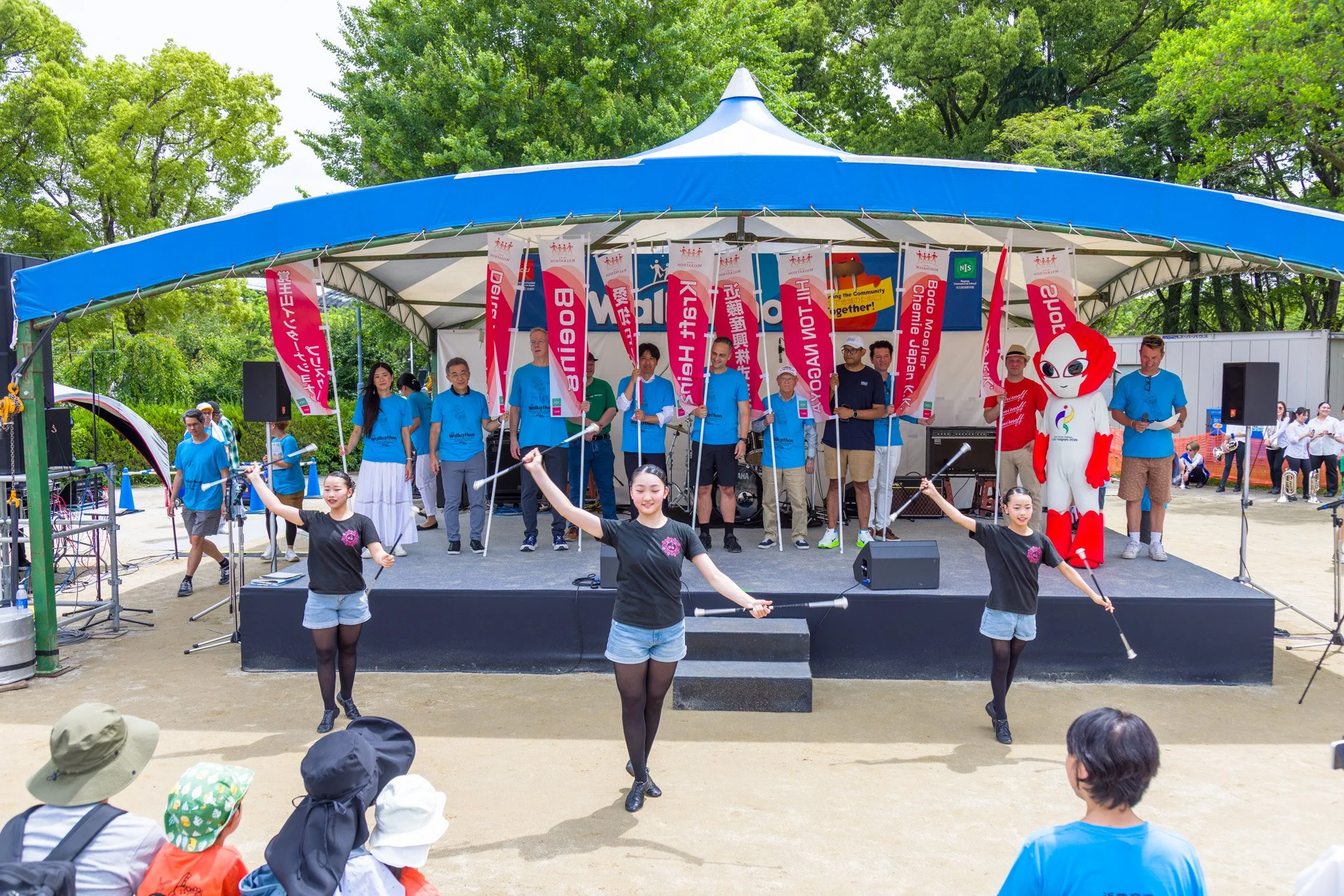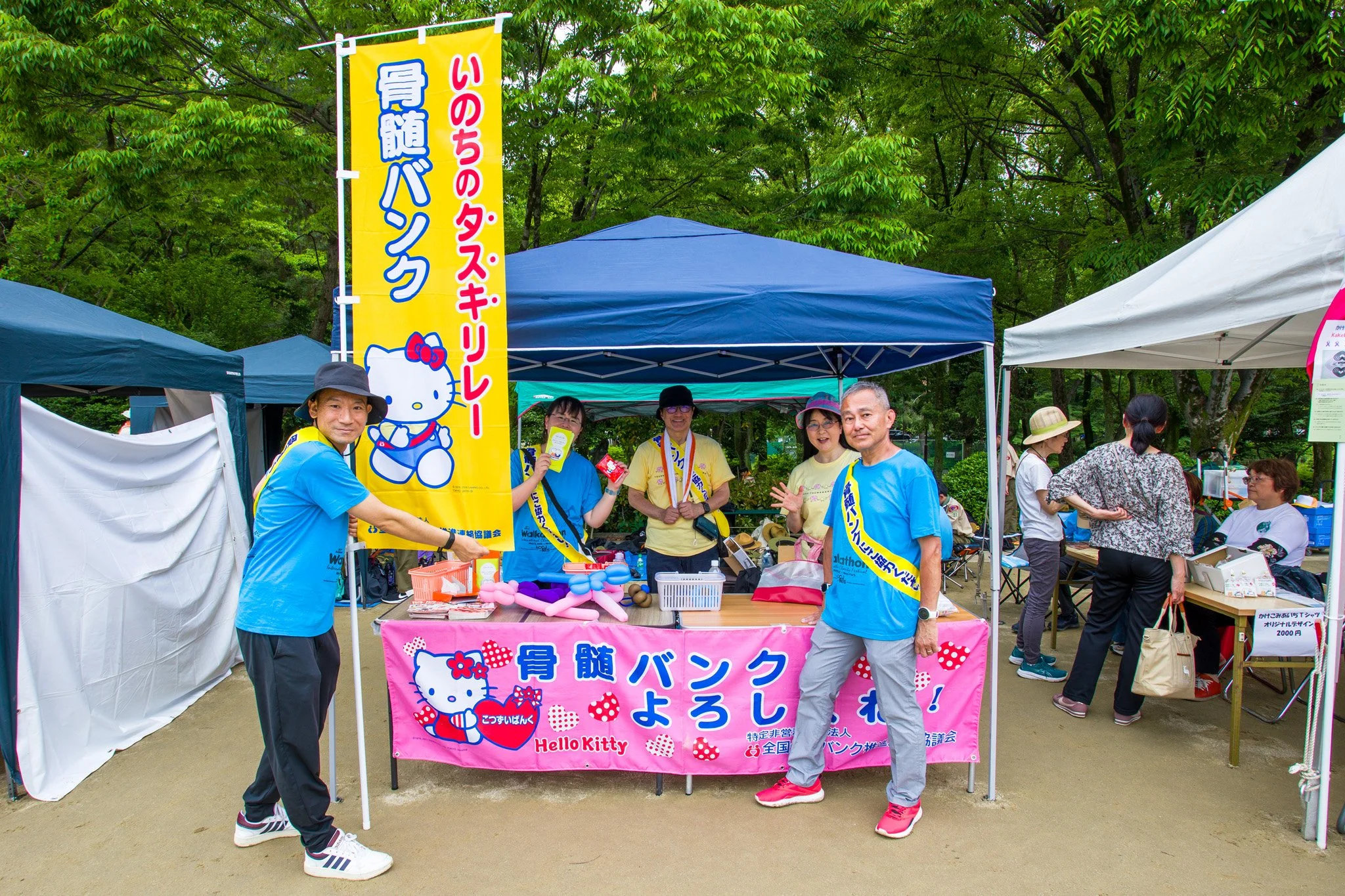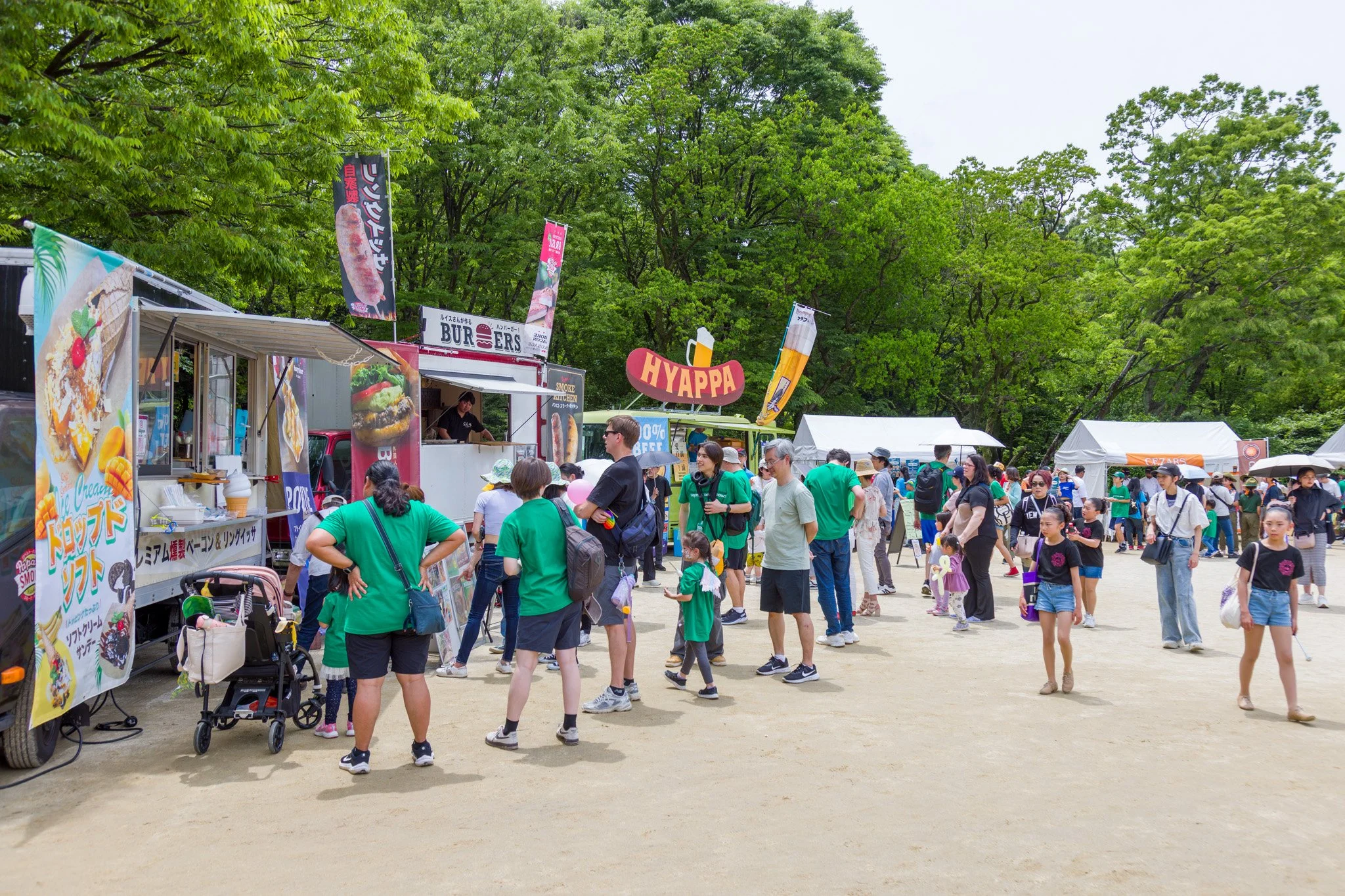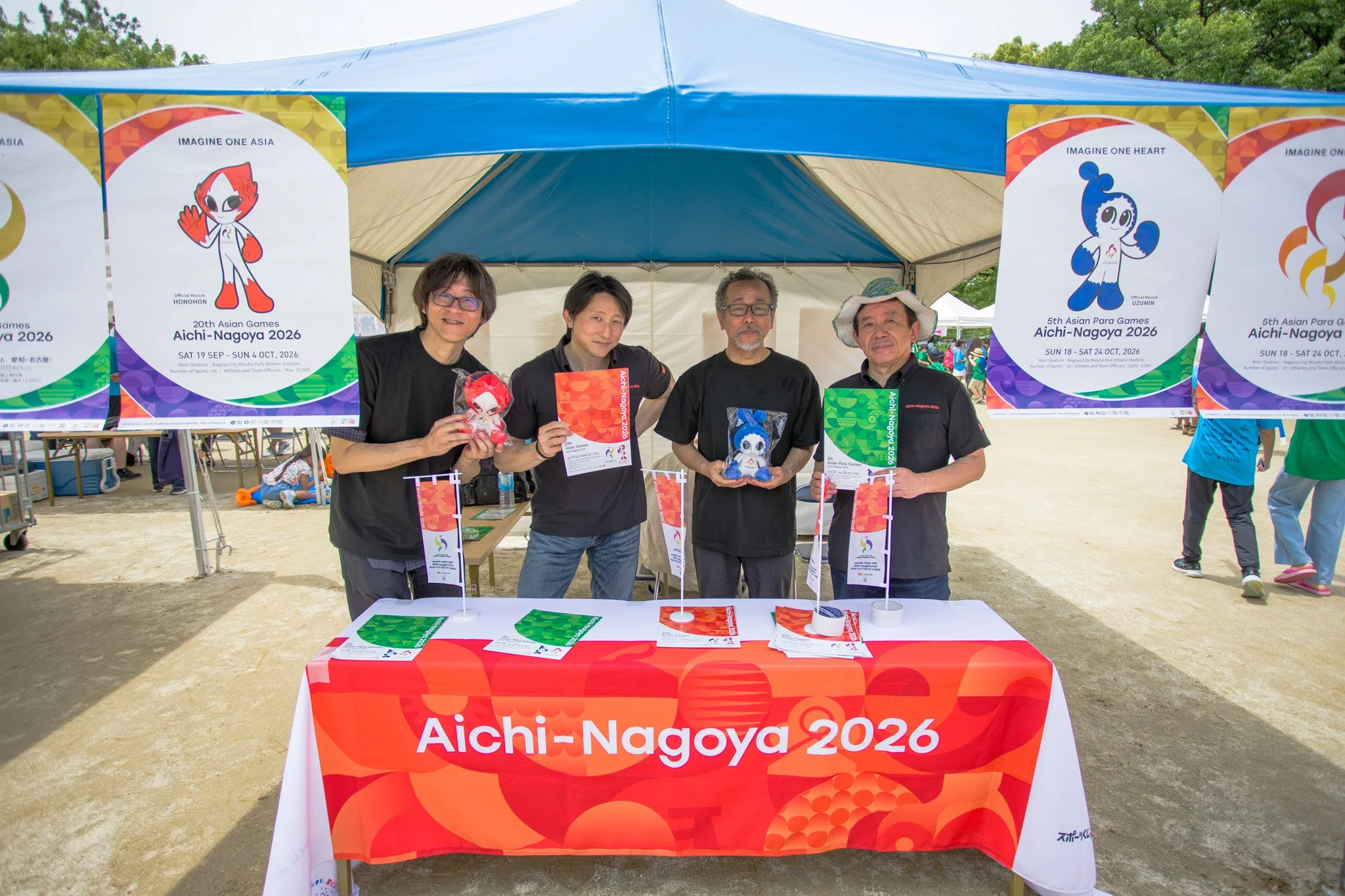Making a Difference Step by Step
This May will mark a major milestone for the ACCJ–Chubu community: the 35th anniversary of the Chubu Walkathon International Charity Festival. You're invited to join the celebration and make a difference.
The Chubu Walkathon invites you to celebrate 35 years of community support.
Photos By Andy Boone
This May will mark a major milestone for the ACCJ–Chubu community: the 35th anniversary of the Chubu Walkathon International Charity Festival. What began in 1992 as a small, collaborative effort between US businesses and local partners has grown into the region’s most visible international charity event—uniting thousands each year for a day of walking, food, entertainment, and community support.
Cofounder Robert Roche, now ACCJ vice president–Chubu, still remembers the first event. “Large corporations were coming to Nagoya saying, ‘It’s our culture in America to give back to the local community,’” he recalled with a laugh. “Harry Hill and I were the young guys doing most of the legwork while they got the spotlight—but in all seriousness, they were the ones who showed us how to do business the right way. Their guidance in those early years gave us a solid foundation, and the relationships we built—with orphanages, schools, and local charities, as well as sponsors like Kondo Sanko, are the reason the Walkathon is still going strong 35 years later.”
Since then, the Walkathon has contributed ¥196 million to organizations across the Chubu region, supporting children in foster care, individuals with illnesses or disabilities, families affected by domestic violence, Tohoku earthquake and tsunami relief, and many others. Over the five years from 2019 to 2023, donations averaged more than ¥5 million per year. The event continued to deliver strong results even through the heart of the pandemic thanks to organizers getting creative with a format that allowed participation amid social distancing.
Community Bridge
The Walkathon is jointly organized by the ACCJ–Chubu Community Service Committee and Nagoya International School (NIS). For event leaders Nao Geisler, Bryce Conlan, and Erik Olson-Kikuchi, the Walkathon is as much about community-building as it is about fundraising.
“Being part of the Walkathon is an immense honor,” said Geisler, who is chair of the committee. “It serves as a bridge between local and international communities. It’s not just raising money—it’s raising awareness, fostering cultural exchange, and demonstrating our commitment to central Japan.”
Fundraising, she added, is only the starting point. “When donations are transformed into real support, it gives people comfort and hope—things they may not be able to create alone.”
At recent donation ceremonies, charities shared messages such as “Your support allowed us to continue assisting children” and “We were able to start a new program thanks to your help.” Conlan, the committee vice-chair, said these words remind us why our work matters.
Festivities with Purpose
The Walkathon remains a highlight of the spring calendar for families across the region. The event features:
- A symbolic walk course through Meijo Park
- Live music, dance, and cultural performances
- Face-painting, crafts, and activities for kids
- An international food court and vendors
- Charity information booths
- A large-scale raffle (100 percent of proceeds donated)
All purchases are made with Walkathon food and activity tickets, and 100 percent of all activity purchases and 20 percent of food purchases are donated.
Celebrating 35 Years
To mark the anniversary, organizers are planning enhanced programming, a retrospective exhibit on the event’s history, and a new “35 Challenges” initiative— including a lead-up program called Walk 3.5K for 35 Days. The committee is also working to raise in excess of ¥15 million, its most ambitious target to date.
Roche hopes this year will set a precedent for the future. “We want this to be a 70-year, even 100-year tradition,” he said. “There’s no reason it can’t continue as long as the community keeps working together.”
He also hopes to see the largest turnout yet. “We’re aiming for more than 3,000 participants. We’ll be sending letters to members—hopefully everyone can help a little.”
Why It Matters
The Walkathon is widely regarded as the ACCJ–Chubu Chapter’s most impactful corporate social responsibility initiative. It strengthens trust between international businesses and local communities, demonstrates long-term commitment, and creates a welcoming environment where residents from Japan and abroad can connect over a shared humanitarian purpose. The Walkathon has also strengthened the ACCJ’s role in the community, highlighting the international business community’s long-standing commitment of contributing to the well-being of the Chubu region.
Join Us in May
With its mix of community spirit, cultural exchange, and real social impact, the Walkathon continues to embody the best of what international collaboration can achieve.
The organizing committee invites companies, families, and individuals to participate, volunteer, or sponsor the event—and to help make the 35th anniversary the strongest year yet.
The 35th Annual Chubu Walkathon takes place May 24. Companies interested in sponsoring are encouraged to contact the ACCJ–Chubu office at chubu@accj.or.jp.
Juneteenth: Seeds of Hope (Audio)
The ACCJ Journal sat down with CIC founder Tim Rowe in the bustling Toranomon Hills networking hub to learn more about how he went from sharing a space with friends to leading a community for entrepreneurs that includes more than 1,000 companies at centers in eight cities around the world.
Legacy Foundation Japan's LaTonya Whitaker shares inspiration and plans to celebrate this important American holiday and build bridges between the US and Japan.
Ahead of the Juneteenth holiday, we sit down with LaTonya Whitaker, executive director of The Legacy Foundation Japan, to talk about plans for the foundation’s Seeds of Hope gala at Tokyo American Club.
As an entrepreneur, the Mississippi native is well known to many in our community for Soul Food House, the comfortable and delicious oasis of authentic Southern food in Azabu-juban. But her work extends far beyond those flavors. In this interview, LaTonya shares her experiences learning about the history of June 19, the inspiration for the gala (now in its second year), and how the business community can get involved.
Learn more about the Seeds of Hope Gala
Learn more about The Legacy Foundation Japan
Growing Greener
The ACCJ Kansai chapter recently led a series of events that brought together community members, businesses, and organizations in an awe-inspiring effort to foster sustainable gardening practices and address food insecurity in the region.
The ACCJ–Kansai leads sustainable gardening and food security initiative.
As our world faces the convergence of issues such as climate change, supply chain disruptions, and economic instability and inequality, food security has become a growing concern.
This holds true right here at home, and the American Chamber of Commerce in Japan (ACCJ) Kansai chapter recently led a series of events that brought together community members, businesses, and organizations in an awe-inspiring effort to foster sustainable gardening practices and address food insecurity in the region.
At the heart of these endeavors is the Healthy Urban Gardening (HUG) initiative, the first event of which was held at the Osaka YMCA International School (OYIS) on a sunny Sunday last November. Hosted by the ACCJ–Kansai Community Service Committee (Kansai–CSC), the day of sustainable fun drew more than 100 attendees, including ACCJ members, supporters, parents, and students, who all came together for hands-on workshops and educational activities.
Viviana Di Blasi and her dedicated team took the stage to demonstrate how to make “seed bombs” using a range of soils and seeds, while Cyd Forster, Eva Spanring-Forster, and members of the local Girl Scouts shared the ins and outs of using worm boxes for vermicomposting, the use of earthworms to convert organic waste into fertilizer. Meanwhile, Mark White and a team from OYIS engaged attendees in the construction of raised planter beds made from discarded wooden cargo pallets.
The depth of knowledge and passion exhibited was further highlighted by a captivating video presentation by Joshua Bryan, an industrious seventh grader who showcased his own home-composting project. The session concluded with an engaging quiz on the importance of composting, prepared by other students.
Throughout the day, the younger attendees actively participated by moving compost from a corner of the schoolyard to a newly established garden area. Armed with shovels and spades, they eagerly loaded compost into wheelbarrows, joyfully transporting it to its new home. Their efforts exemplified a shared sense of purpose and commitment to create a more sustainable environment.
In addition to the enriching workshops, the event offered moments of entertainment and generosity. During a well-deserved break, attendees were treated to musical performances by talented students. Not only were these performances entertaining, but they also served to raise funds for Food Bank Kansai, a Kobe-based non-profit organization that collects donated food products and distributes them to people in need, single-mother families, and others.
The ACCJ has long been a supporter of Food Bank Kansai’s vital work, and donations collected during the events—as well as the ongoing support from ACCJ members—have helped Food Bank Kansai continue their mission of providing food assistance to those in need.
Building on this success, the Kansai–CSC continued its commitment by organizing a second HUG workshop together with Deutsche Schule Kobe International (DSKI). Held in April, the event attracted more than 100 participants and featured a range of activities that further underscored the importance of community-driven vegetable gardens and sustainable living practices.
The HUG initiative has energized community engagement and grown a sustainable circle of direct fresh vegetable donations.
These collaborations with OYIS and DSKI were not only about education and hands-on experiences, but also had a profound impact on the community, showcasing the power of collective effort in addressing pressing issues. By working together, we can create a greener, healthier, and more sustainable future for Kansai and beyond.
Investing in Kochi Prefecture
For most, investing brings to mind index funds, real estate investment trusts, or property. But what about investing in the growth of your local community via beer, tourism, or fitness? In Kochi, on the island of Shikoku, three families are looking beyond plain profit as they seek to revitalize and secure the future of their communities in unexpected ways.
How three expat families are making a difference in rural Japan
Listen to this story:
For most, investing brings to mind index funds, real estate investment trusts, or property. But what about investing in the growth of your local community via beer, tourism, or fitness? In Kochi, on the island of Shikoku, three families are looking beyond plain profit as they seek to revitalize and secure the future of their communities in unexpected ways.
Fitness Fans
Violet and Carlo Pacileo decided to move to Otoyo to help Violet’s mother restore the family’s land. But the enterprising duo decided they could do more.
“Aging populations, businesses dying out, houses being abandoned … these are issues all of Japan’s rural communities are facing. But seeing the impact firsthand in Otoyo was heartbreaking,” Violet explained.
Having spent her career analyzing businesses and investment potential, Violet quickly understood that the community needed an injection of private capital. “After years working for large financial institutions, this is my chance to give back to the community.”
The Pacileos recently received approval to start building a CrossFit box, in other words a barebones gym. While the idea is unconventional, they have done their research. “Shikoku doesn’t have a box yet and the weightlifting association in Kochi told us there are only two facilities where they can drop weights—and both are in public high schools,” Violet said. “I knew then that there would be a market, and that we had to get in while the fitness industry here is still in its infancy.” She expects their new business not only to bring fitness-loving visitors to Otoyo, but also to help improve health issues in the community.
Beer Brewers
Former California residents Kenneth and Masako Mukai moved to Niyodogawa-cho to start a brewery, which opened in November 2020. Although this may seem an odd thing to do in a village of 5,000 people, the Blue Brew Taproom is already a hit.
Kenneth explained that the brewery is having multiple positive effects on the local economy. “Our local post office gets more business from us shipping our products, and the local government receives tax funds from people buying our beer through the furusato nozei program. Sales at restaurants and hotels around us have gotten a boost, as our customers often stay nearby.”
The Mukais buy locally produced items such as tea, ginger, and Satsuma-imo (sweet potatoes), which they use as flavoring, and collaborate with six farmers to grow hops, creating a new market in the community.
They have many supporters among the owners of established businesses in the area, and their positive example has also brought about changes in the village government’s perception of investment from outside. “The chiiki-okoshi kyoryoku-tai program used to be closed to non-Japanese applicants, but, in April, the first American member was accepted and moved here with his family!” Kenneth said.
Hospitality Queen and Organic Farmer
Australian Rosie Moloney and her husband, Tsuyoshi, live in the 1,481-person village of Mihara. They know well the importance of leading by example and engaging with the community.
“When I first presented my plan to start a guesthouse, many locals asked, ‘Who would want to come here?!’” Rosie explained. “People can’t see the value of what they have, and it can take someone from outside to open their eyes and show them the opportunities outside the infamous box.”
Clearly, her guests agree. Rosie now runs two highly rated guesthouses in the Shimanto area, while also engaging in permaculture and helping with Tsuyoshi’s organic rice fields.
“I see such beauty, value, and potential here,” she said. “I started guesthouses to encourage the tourism industry and create new job opportunities.”
Many of Rosie’s guests—Japanese and those from abroad—stay for several days and contribute to the village economy through visits to restaurants and shops, as well as by booking outdoor activities. According to her, “Guests often say that the fondest memories of their trip are [those of] interacting with locals.”
Learn more about Kochi: visitkochijapan.com/en

